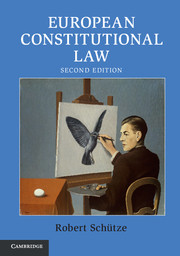Book contents
- Frontmatter
- Dedication
- Summary Contents
- Contents
- List of Illustrations
- List of Tables
- List of Cases
- List of Secondary Law
- Table of Equivalents
- List of Abbreviations
- Acknowledgements
- Introduction: European Constitutional Law
- Part I Constitutional Foundations
- Part II Governmental Powers
- 7 Legislative Powers: Competences and Procedures
- 8 External Powers: Competences and Procedures
- 9 Executive Powers: Competences and Procedures
- 10 Judicial Powers I: (Centralised) European Procedures
- 11 Judicial Powers II: (Decentralised) National Procedures
- 12 Judicial Powers III: EU Fundamental Rights
- Appendices
- Index
- References
9 - Executive Powers: Competences and Procedures
from Part II - Governmental Powers
- Frontmatter
- Dedication
- Summary Contents
- Contents
- List of Illustrations
- List of Tables
- List of Cases
- List of Secondary Law
- Table of Equivalents
- List of Abbreviations
- Acknowledgements
- Introduction: European Constitutional Law
- Part I Constitutional Foundations
- Part II Governmental Powers
- 7 Legislative Powers: Competences and Procedures
- 8 External Powers: Competences and Procedures
- 9 Executive Powers: Competences and Procedures
- 10 Judicial Powers I: (Centralised) European Procedures
- 11 Judicial Powers II: (Decentralised) National Procedures
- 12 Judicial Powers III: EU Fundamental Rights
- Appendices
- Index
- References
Summary
Introduction
What are the ‘executive’ powers of the European Union? In many constitutions the executive branch has a residual character: anything that is neither legislative nor judicial is considered to fall within its scope. The negative definition of the executive function has historical reasons. For the original purpose of the separation-of-powers principle was to remove powers from an almighty monarch to a Parliament and the judiciary.
The problem with this negative definition however is its uncertain and relative nature; and serious attempts have been made positively to identify ‘prerogatives’ of executive power. Outside the field of external relations, two such prerogatives have traditionally been recognised. First, the executive power is – naturally – identified with the task of executing laws, and thus with the aim of maintaining internal peace. The task of law enforcement is complemented by a second – seemingly contradictory – demand. Executive power is identified with the power to ‘govern’, that is: to lead and direct the political community. The executive branch is here the ‘centre of impulse and decision’. Despite their contradictory outlook, both traditional prerogatives of the executive – the reactive task to enforce laws and the active task to propose laws – are still based on a common idea: the executive enjoys the power of decision.
The power of decision is typically contrasted with the power to adopt legislation. For in the ‘legislative State’ of the nineteenth century all legal norms must be adopted by Parliament. And that Parliament cannot delegate power to the executive was seen as ‘a principle universally recognized as vital to the integrity and maintenance of the [democratic] system of government ordained by the Constitution’. This constitutional ideal would however find limits in the normative needs of the ‘administrative State’ of the twentieth century. Modern parliaments would simply have no time – nor expertise – to ‘master all the details of tea chemistry and packaging in order to specify the precisely allowable limits of dust, artificial coloring, and the like that would affect suitability for consumption’. Industrial societies required a ‘motorised legislator’; and this secondary ‘legislator’ was to be the executive. The advent of the legislating executive indeed ‘constitutes one of the most important transformations of constitutionalism’. In the administrative State the executive branch thus gains a third power: the power to adopt (delegated) legislation.
- Type
- Chapter
- Information
- European Constitutional Law , pp. 302 - 342Publisher: Cambridge University PressPrint publication year: 2015



